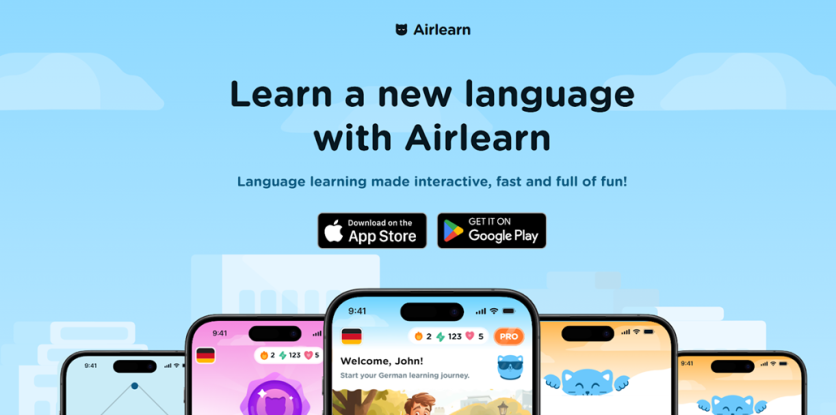
A new name in language learning is proving that people want more than gamified apps. Airlearn, launched in 2024, has quickly gained attention from learners in the United States and globally. The company reports that it has over 2 Million users from 150+ countries, and users completed over 10 Million lessons just in the last 30 days. These numbers place Airlearn among the rare education startups that not only attract downloads but also maintain sustained engagement.
Engagement at Scale
Public signals indicate that learners are completing lessons at a pace rarely seen among new entrants. The founder of Airlearn, Gaurav Munjal, celebrated 1 Million lessons completed in October 2024 as an early marker of momentum. On Apple's App Store, Airlearn carries a 4.8-star rating, while Google Play shows a rating of 4.7 from over 18K reviews. Reviews frequently describe it as a platform for users who felt stalled in other apps and wanted more realistic speaking practice.
Signals from U.S. Learners
The United States has become one of Airlearn's strongest markets. Coverage earlier this year noted that the majority of its users come from the U.S., U.K., and Germany. That traction matters: America is one of the most crowded arenas in edtech, with Duolingo, Babbel, and Rosetta Stone all competing for attention. Airlearn's lesson-completion metrics suggest it has found a foothold, particularly among learners who want confidence speaking, not just casual exposure.
User behavior reinforces this trend. Reviews and public commentary indicate that U.S. learners are consistently engaging with conversation-based lessons and returning regularly for practice. Many highlight the practical focus on real-world dialogue, which contrasts with gamified or purely vocabulary-driven platforms. This suggests Airlearn is not just attracting downloads but cultivating an active, motivated user base that prioritizes speaking proficiency over superficial app engagement.
How Airlearn Fits a Changing Market
Airlearn's growth has less to do with flash and more to do with routine. Lessons are structured to take only a few minutes but build naturally into conversation. Grammar and vocabulary are taught in context, so users practice full sentences instead of memorizing lists. This design, the company says, makes the leap from app to real-world speaking feel smoother.
The approach also answers a long-standing challenge in language apps: dropout rates. Millions download free tools each year, but stop using them within weeks.
Competing with the Giants
Duolingo remains the most downloaded language app globally, fueled by its addictive, game-like interface. Babbel and Rosetta Stone appeal to learners who prefer more traditional structures. Airlearn is carving out space in between, targeting those who want everyday speaking practice without the formality of a classroom or the superficiality of streak chasing.
That middle ground is proving powerful. Airlearn's ability to sustain engagement shows it can turn casual learners into long-term users, a transition that has challenged even the largest competitors. By positioning itself as the platform that makes speaking practice both natural and consistent, Airlearn is showing it can do what rivals have struggled to deliver.
AI Tutor Launch
Airlearn has now added an AI Tutor to extend its conversation-first model. The Tutor simulates real dialogue, letting learners practice speaking, ask questions, and get instant feedback at their own pace. By turning lessons into interactive exchanges, it offers a scalable way to build confidence, something most language apps struggle to deliver today.
"At Airlearn, our mission has always been to make language learning truly conversational. With the Airlearn AI Tutor, we're creating an experience that feels human, helps learners progress faster, and sets a new standard for what's possible in language learning," said Gaurav Munjal, Founder & CEO, Airlearn.
What Comes Next
The company is preparing to deepen its U.S. presence and expand further into Europe. The challenge ahead is keeping growth disciplined, avoiding the trap that has weighed down other edtech players: layering on flashy features at the cost of substance. For Airlearn, the real test is holding onto the clarity of its mission: delivering a tool that feels useful every single day.
What its first year makes clear is that people don't need games to stay motivated. They need progress they can hear in their own voices. With almost a third of their reviews contrasting the learning experience and outcome on the app to rivals, Airlearn has proven that language learning sticks when the outcome is speaking confidence, not just streaks. That focus on real-world fluency is what positions Airlearn to set the pace for the next chapter in language learning.
ⓒ 2026 TECHTIMES.com All rights reserved. Do not reproduce without permission.




